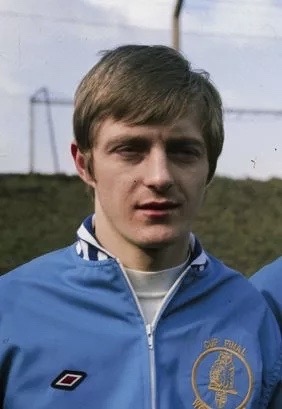BY Vince Cooper
Denis Law broke the British transfer record fee twice, when both joining and leaving Torino. The man who surpassed Law’s record did the same.
Allan Clarke was from perhaps the ultimate footballing family with no less than four of his brothers also playing the professional game. First up was Frank who started his league career with Shrewsbury Town. Allan kicked off at Walsall and the three brothers who followed him into the game, Derek, Kelvin and Wayne also began at Fellows Park.
Whilst at school Allan represented Willenhall Boys under-11s but he was initially turned down by Birmingham’s County selectors who decided he was too small. Joe Mercer, then manager of Aston Villa, clearly didn’t think so and he invited the youngster for a week’s trial. After the seven days he was invited to join the Villa Park groundstaff but came to the conclusion that the club might be ‘too big’ for him at that stage of his career and looked instead to closer-to-home Walsall.
Clarke, by now a regular for South Staffordshire schoolboys, also turned down West Bromwich Albion, instead signing for Saddlers manager Bill Moore in 1961. The decision to start lower down the ladder paid off as ‘Tiny’ (as he was known at the time – the ‘Sniffer’ moniker coming later) made his first-team debut aged 16, given his chance because it was regular inside-right Jimmy O’Neill’s wedding day.
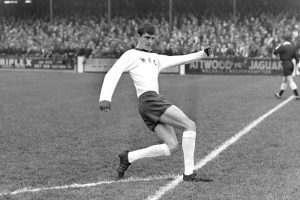
In Walsall colours
Not long after Clarke’s debut, manager Moore was sacked. His replacement Alf Wood lasted only a few weeks before he too was given his marching orders, reportedly for his insistence on picking Clarke. After Wood left Clarke argued with then Chairman Ernie Thomas and requested a move. But it was Thomas who left, replaced by millionaire Bill Harrison who brought in a new manager, Ray Shaw and a number of players experienced at an higher level including Trevor Smith and Howard Riley.
Thriving on playing with the new teammates, Clarke quickly started finding the net on a regular basis and he finished the 1964-65 season with 23 goals and winning Walsall’s Supporters Club Player of the Year award .
It was a goal in the shock F.A. Cup win at Stoke that brought The youngster to the attention of scouts. The leading suitors were Vic Buckingham at Fulham and Matt Gillies at Leicester and it was the Londoners who won the day when Walsall accepted a bid of £35,000, the fifth made by Buckingham and Clarke, aged just 19, moved south having spent three years at Walsall scoring 41 times in 72 games and finishing as the team’s top scorer in two successive seasons.
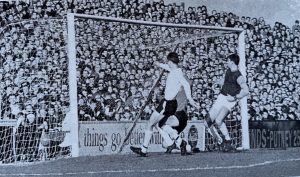
Clarke finds the net against West Ham United
At Craven Cottage Clarke effectively replaced Rodney Marsh in the line-up with the latter having been sold to Queen’s Park Rangers for £15,000 after falling out with boss Buckingham.
The team had hit some form in the midst of a relegation battle when Clarke joined and he initially found it hard to get a place in the line-up, to such an extent that one newspaper labelled him ‘Fulham’s £35,000 embarrassment’. He finally got his break, coming on as sub for an injured Johnny Haynes, against Leeds, and did well enough to keep his place and help guide the Londoners to safety, with the club finishing one place above the drop zone.
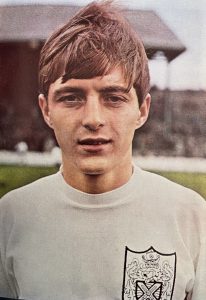 W
W
In Fulham colours
In the following campaign Clarke managed 24 goals in 42 games as his team finished in a relatively ‘comfortable’ 18th place but in 1967-68, despite another 20 goals from their leading scorer, the Cottagers finished at the foot of the top flight and were relegated.
After his club’s drop down to the second flight it was no surprise to see Clarke coveted by a number of top flight teams. It was also no surprise that Leicester manager Matt Gillies, who had coveted the player in his Walsall days, snapped him up for a British transfer record £150,000. The player left West London with a record similar to the one he recorded at his previous club, netting 45 times in 86 games for the Cottagers.
But the move to Filbert Street came only after the forward had been set to join a bigger club. Manchester United manager Matt Busby travelled to London with assistant Jimmy Murphy intent on signing Clarke after agreeing to pay Fulham’s asking price.
”I met Matt Busby in London and I can remember him getting off the train at King’s Cross and pointing to me to get into a taxi”, Clarke later recalled. “I did that and they both joined me and Matt told the taxi driver to drive around London.
”He told me he wanted me to sign for United.
”I’m only 21-years-old and I said ‘Yes, Mr Busby, I would like to join you’ and with that I went back home”.
Fulham then told him that previous suitors Leicester had matched Busby’s £150,000 offer and Clarke decided he wanted to cover all options.
”I agreed to meet Matt Gillies who was then manager at Leicester”, remembered Clarke.. Sometimes when you meet someone for the first time you know instantly that you like the fella and that was the case with Matt Gillies. So I signed for Leicester.
”I rang Matt Busby to tell him I had joined Leicester and he said ‘Fair enough’ and wished me all the best”.
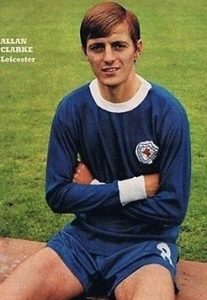
In Leicester City colours
Sadly for Clarke, the relationship with Gillies didn’t last long. His new club made a terrible start to the 1968-69 season and by November the manager was gone, replaced by Frank O’Farrell.
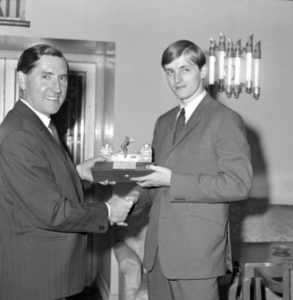
Manager Frank O’Farrell hands Allan his Cup final ‘Man of the Match’ trophy
The Foxes new boss managed to conjure an F.A. Cup run out of his charges, they eventually lost 1-0 in the final to Manchester City. Clarke, despite later admitting that he had become unhappy at Filbert Street once Gillies left, scored the winner in the semi-final against West Bromwich Albion and was chosen as Man of the Match in the final.
Despite Clarke’s best efforts, Leicester couldn’t escape the drop, finishing one point adrift of safety so the striker suffered his second successive relegation. But the next move would ensure that there wouldn’t be a third.
It was Don Revie, boss of champions Leeds United, who moved in with a bid of £165,000, one a recently relegated club couldn’t refuse, and Clarke was on the move again.
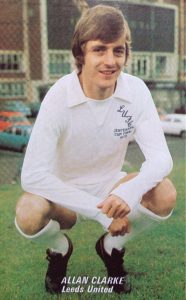
In Leeds colours
After securing the Charity Shield on his debut for the club and having scored on his first league start in a 3-1 win over Spurs, Clarke’s initial season at Elland Road was full of near misses. Runners-up in the league to Everton., Leeds were beaten in a memorable European Cup by Celtic and were denied the F. A. Cup after Chelsea beat them in an Old Trafford final reply
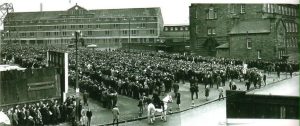
Fans line up for tickets before the European Cup semi-final between Celtic and Leeds United, ‘The Battle of Britain’
Don Revie’s team were seen as hot favourites to see off Celtic and move on to the European Cup final but after the Scottish team recorded a shock single-goal victory at Elland Road they followed up with a 2-1 win at Hampden Park in front of 136,505 fans, of whom only 4,500 had made the journey from Yorkshire.
Leeds actually drew level on aggregate when Billy Bremner smashed in a shot from 30 yards that flew into the net off the angle of post and bar. After that, Celts winger Jimmy Johnstone took over, running England left back Terry Cooper ragged. A John Hughes header was followed by Bobby Murdoch firing home after a one-two with Johnstone and Celtic qualified for their second European Cup final.
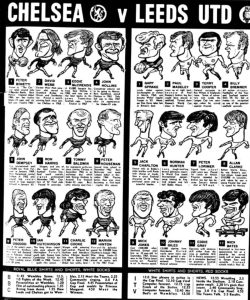
The 1970 FA Cup final teams
Leeds played a total of 62 games during the season and a fixture backlog and the fatigue it caused no doubt caught up with them at the season’s climax. United had played nine games in 22 days when Revie led them onto the pitch for the F.A. Cup final. They went in front twice but were pegged back by a dogged Chelsea team who forced the game into extra-time, and an eventual replay, late on when Ian Hutchinson grabbed a second equaliser
In the replay Clarke played a big part in Leeds going in front for a third time when he evaded several challenges and sent Mick Jones clear to score. Again Chelsea came back, equalising with 12 minutes left and then grabbing the winner in extra-time.
Clarke formed a great strike partnership, and friendship, with Jones recruited from Sheffield United. The pair scored a combined 52 league goals in their first season together and complemented each other with Jones’ more physical approach dovetailing well alongside Clarke’s predatory instincts. Eddie Gray and Peter Lorimer provided ammunition from the wings whilst Johnny Giles and Billy Bremner prompted from midfield.
Clarke’s form also earned a first call-up to the full England team after making a number of under-23 appearances during his time at Fulham (including scoring four times on his under-23 debut, an 8-0 thrashing of Wales in 1966 and teaming up with Jones for the first time in a 3-0 win over Austria).
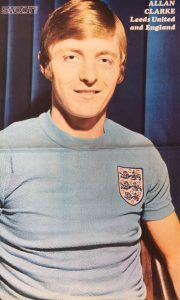
The forward’s impressive displays in the 1969-70 season, which included 26 goals, saw him earn a place in the England squad for the World Cup in Mexico. With England playing Czechoslovakia in Guadalajara in their final group game and needing victory to ensure progress to the quarter-final. Clarke was chosen to play up front with Jeff Astle, and he was handed the ball when England were awarded a disputed penalty shortly after half-time. He duly dispatched the kick which proved to be the match-winner ensuring his country’s progress to the last eight.
Clarke was left out for the quarter-final loss to West Germany but would go on to win a total of 19 caps for his country, scoring 10 times, including a record of a goal-a-game in his first four appearances.
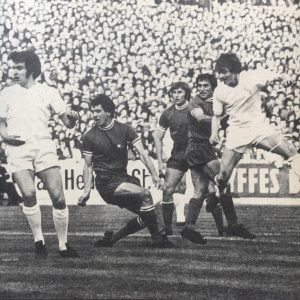
Allan finds the net against Juventus
The following year saw another near-miss for Leeds as they were beaten in the title race by Arsenal after suffering a disappointing loss to West Brom when Clarke had what looked like a perfectly good goal chalked off. Consolation came in the Inter-Cities Fairs Cup where Leeds, with help from a Clarke goal, overcame Juventus in the final.
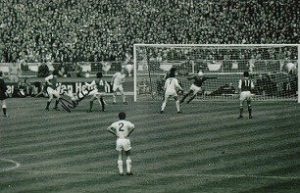
The Wembley winner
In 1971-72 Clarke finally captured a big domestic honour and he played a major role, scoring the winner with an excellent diving header (from a cross from Jones) against Arsenal in the centenary F.A. Cup final. Not only did the goal earn his team the Cup, it also helped the player take his second Wembley Man of the Match award.
Despite that success the season could again be justifiably categorised as one that could have been so much better. Leeds travelled to Molineux on the Monday after the final needing just a draw to clinch the title, and the double. But Wolves came out on top 2-1 against a clearly exhausted United, handing the crown to Brian Clough’s Derby County.
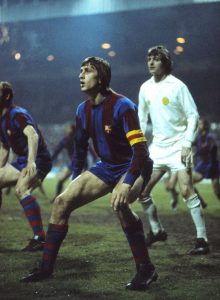
In action against Barcelona
The 1972-73 season provided yet more disappointment for Leeds fans and for ‘Sniffer’. They dropped to 3rd place in the league, and missed out in two cup finals, losing to Sunderland in the F.A. Cup at Wembley and being beaten by Milan in Greece in the final of the European Cup Winners Cup, a match he missed through injury.
Finally in 1973-74 Clarke captured the holy grail of the 1st Division title, as Leeds rode an unbeaten run of 29 games to finish five points clear of Liverpool. Clarke had a mediocre (by his own high standards) season in front of goal, finding the back of the net just 16 times but a title-winners medal more than compensated.
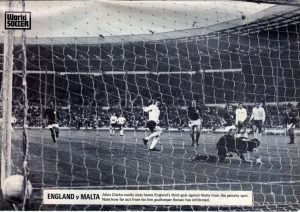
Scoring for his country against Malta
By this time Clarke was an England regular and he played in the Wembley disaster against Poland which led to England being eliminated from the 1974 World Cup, and to Sir Alf Ramsey losing his job as national team manager, to be replaced by Sniffer’s club boss Revie.
Leeds appointed Brian Clough as Revie’s replacement, a disastrous move which lasted just 44 days. Jimmy Armfield moved into the hot seat and he took the team to the 1975 European Cup final where they lost in controversial circumstances to Bayern Munich in Paris.
Some appalling refereeing decisions including a blatant penalty not being given and a ‘goal’ decision being overturned after Bayern skipper Franz Beckenbauer appeared to convince man in the middle Michal Kitabdjisn to overturn his original ruling led to crowd unrest and riots which in turn would lead to a four-year European ban for the club.
Armfield had performed wonders in getting his team to the final as the 1974-75 season saw a transitional Leeds team drop to 10th in the table with new arrival Joe Jordan topping the scoring charts and an injury-hit Clarke managing just seven goals.
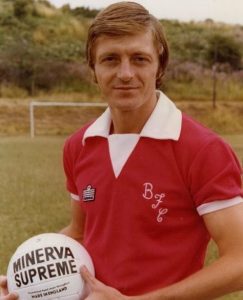
Barnsley’s player-manager
Clarke’s remained at the club until 1978 but injuries had taken their toll and his last season at Elland Road saw him make just nine starts, scoring four times. In the summer of he moved to Barnsley for £45,000 taking over as Player-manager at Oakwell.
In his first season with his new club he led them to promotion from the 4th Division, scoring 12 goals in 34 games.
Clarke finally hung up his boots in 1980 but continued as manager of Barnsley until he was lured back to Elland Road to take over from the fired Jimmy Adamson. His exploits in the manager’s office failed to match those in the pitch and Leeds were relegated from the top flight in the 1981-82 season after which he resigned and was replaced by fellow Revie star Eddie Gray.
Further spells in charge at Scunthorpe United – who shocked Leeds in an F.A. Cup 3rd round tie, Barnsley again and Lincoln City followed but he seemed to be constantly working on tight budgets with sustained success hard to come by.
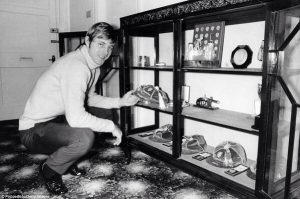
England caps on display
Clarke finally left the game in 1990 and despite representing seven clubs on and off the pitch it is his Leeds playing career for which he is undoubtedly best remembered. With well over 200 goals (151 of them for United including an F.A Cup winner), he was the archetypal ‘fox in the box’ rarely scoring from distance but always alert to the half-chance which he would more often than not put away and then turn raising a single arm in the air in a trademark salute.
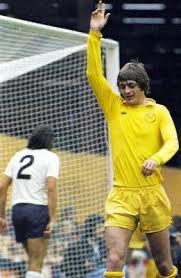
A trademark goal salute
At £395,000 in total transfer fees Allan Clarke didn’t come cheap, but the rewards he brought to all of his clubs certainly made him good value for money.

